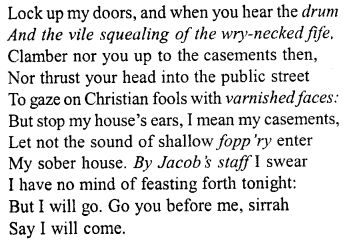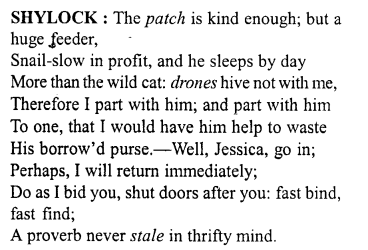Merchant Of Venice Act 2 Scene 5 Questions And Answers
ICSE SolutionsSelina ICSE SolutionsML Aggarwal Solutions
EnglishMathsPhysicsChemistryBiology
Act 2 Scene 5 Merchant Of Venice Workbook Important Questions and Answers
Passage – 1 (Act II, Sc.V, Lines 30-40)

Paraphrase :
Lock up my doors, and when you hear the- drum, And the vile squealing of the long-necked pipe, Don’t run up to the windows then, Or thrust your head into the public street To gaze on Christian fools with varnished masks; But stop my house’s ears-1 mean my windows; Don’t let the sound of shallow foolishness enter My sober house. By Jacob’s staff, I swear I don’t want to go feasting outside tonight; But I’ll go. You go ahead of me, servant; Say I’ll come.
Word Meaning With Annotation
Drum and the vile squealing of the wry-necked fife : probably refer to the players, rather than the instruments, i.e. drum is the same as our “drummer”. In a work called English Gamer Tudor Tracts, we hear that a “drum…. was shot in both legs.” Similarly “fife means a fife-player”, “wry-necked” (i.e. corrked-necked) refers to the fact that it was necessary for the fife player to twist his head to one side when playing his instruments, vanished faces : Faces painted or made up with colour, foppery : foolery, by Jacob’s staff : Shylock swears by the staff which his ancestor, Jacob, is said to have carried according to biblical stories.
Read the above passage and answer the following questions
Question 1.
What is the occasion for speaking of these words?
Answer:
When Lancelot speaks of the masque arranged by Lorenzo and others, Shylock warns his daughter before leaving the house to attend the feast to be given by Bassanio. Shylock asks his daughter Jessica to lock all the doors of his house. He urges her not to climb upto the windows and look out into the street when she hears the drum.
Question 2.
What is the meaning of the phrase ‘wry-necked fife’? Explain meaning of third line in the passage.
Answer:
The phrase “wry-necked fife” means a wry-necked musician for he always looks away from his instrument. Shylock warns Jessica not to climb upto the windows to see what is going on in the street when she hears to sound of the drum and the hatefull noise of the fife, which is a musical instrument having a bent mouth.
Question 3.
What light does the above passage throw on the character of Shylock?
Answer:
The above mentioned passage shows that Shylock is a strictly religious Jew. He is shocked to hear that there will be masques in the street. He objects to such profane shows. Moreover, he does not want his young daughter to watch such shows of dance and merriment. He does not want his strictly religious house to be profaned with any sound of loose enjoyment.
Question 4.
Explain the significance of the line “To gaze on Christian fools with varnished faces”.
Answer:
The above mentioned lines reveal Shylock’s hatred for Christians. The phrase ‘Christian fools’ shows Shylock’s contempt and hatred for the people who persecute his race, and for whose religion he has no respect.
Question 5.
Is Shylock interested in attending the feast to be given by Bassanio?
Answer:
Shylock has no desire to go out in order to attend any feast. He even swears by Jacob’s staff, which is sacred for the Jews, that he has no wish to go to the feast. However, he decides to go probably to fees on the prodigal Christian.
Passage – 2 (Act II, Sc.V, 45-56)


Paraphrase :
SHYLOCK : The man is kind enough, but a huge eater; Snail-slow in worth, and he sleeps by day More than the wild-cat does; drones don’t live with me, So I’m parting with him; and send with him To one that I want him help to waste His borrowed purse. Well, Jessica, go in; Perhaps I’ll return immediately: Do as I tell you, shut doors after you:” Fast bind, fast find,” A proverb that’s never forgotten in a successful Exit.
JESSICA : Goodbye; and, if my fortune is not crossed, I have lost a father, and you a daughter.
Word Meaning With Annotation
Patch : fellow. Drones : idlers. Stale : old-fashioned. If my fortune be not crost : unless I have bad luck. Pent-house : overhead shelter
Read the above passage and answer the following questions
Question 1.
With whom Shylock is engaged in conversation. What place is this? Who else is present there?
Answer:
Shylock and Jessica are engaged in coversation. The place is Shylock’s residence. Launcelot too was present there. He had just left.
Question 2.
A man is described as ‘kind enough’. Who is he? Does the speaker mention some negative quality of the person concerned?
Answer:
The person referred to as ‘kind enough’ is Launcelot, who has been a servant in the house. He is leaving Shylock to join Bassanio’s service. Shylock admits that Launcelot is a nice sympathetic fellow. But he is a glutton. He eats too much. This for Shylock is a disqualification. Added to this is Launcelot’s laziness. He is very slow in doing work.
Question 3.
What is the point of comparison between Launcelot and a wild cat?
Answer:
Launcelot sleeps too much. He is thus like a wild cat which is an animal of nocturnal habits as it sleeps by the day and prowls by the night.
Question 4.
“drones hive not with me,”
What does Shylock want to say here? Refer to his three comparisons.
Answer:
Shylock declares that he cannot put up with idle and lazy persons like Launcelot. The male bee is called the drone. It never searches for honey but depends upon the female bee to do all the work.
Launcelot is a drone. Shylock cannot give shelter to a person like him. Such is this man’s laziness * that it stirs his master’s fancy. Shylock compares him to three different animals in two lines-wild cat, snail, drone.
Question 5.
Shylock is glad to part with the person? What are the reasons?
Answer:
Shylock is glad to get rid of a slow and lazy person like Launcelot. As a servant he is a mere liability. Shylock is glad that Launcelot is leaving him to take service under Bassanio. This servant will disable his new master’s means which he has just raised by borrowing money. Shylock hates all Christians. It gives him great pleasure if Bassanio’s money is wasted in this manner, and he is unable to repay his loan.
Question 6.
Shylock refers to a proverb, “fast bind, fast find,” How do you apply it to this situation?
Answer:
Shylock advises his daughter to shut all the doors after he is gone. He refers to the proverb which says that what you lock up securely will be found safe when you return. This means that good watch prevents misfortune.
These words of Shylock are full of dramatic irony. He quotes the correct proverb. He seems to be very cautious about things. But he does not know that he will find his daughter and his money gone when he returns. A shock awaits him.
Merchant of Venice Workbook Questions and Answers
- Merchant of Venice Act 1 Scene 1 Workbook Answers
- Merchant of Venice Act 1 Scene 2 Workbook Answers
- Merchant of Venice Act 1 Scene 3 Workbook Answers
- Merchant of Venice Act 2 Scene 1 Workbook Answers
- Merchant of Venice Act 2 Scene 2 Workbook Answers
- Merchant of Venice Act 2 Scene 3 Workbook Answers
- Merchant of Venice Act 2 Scene 5 Workbook Answers
- Merchant of Venice Act 2 Scene 6 Workbook Answers
- Merchant of Venice Act 2 Scene 7 Workbook Answers
- Merchant of Venice Act 2 Scene 8 Workbook Answers
- Merchant of Venice Act 2 Scene 9 Workbook Answers
- Merchant of Venice Act 3 Scene 1 Workbook Answers
- Merchant of Venice Act 3 Scene 2 Workbook Answers
- Merchant of Venice Act 3 Scene 3 Workbook Answers
- Merchant of Venice Act 3 Scene 4 Workbook Answers
- Merchant of Venice Act 3 Scene 5 Workbook Answers
- Merchant of Venice Act 4 Scene 1 Workbook Answers
- Merchant of Venice Act 5 Scene 1 Workbook Answers
